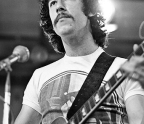BIFF BYFORD
On a sunny day in London, Biff Byford sits in the restaurant of the Sanctum hotel in Soho, leans back in his chair and smiles at the thought of getting his first tattoo at the age of sixty-eight. The Saxon singer is looking ahead to his band’s 40th anniversary tour, which includes a date on October 19 at London’s Eventim Apollo – the old joint famously known in years gone by as the Hammersmith Odeon. The scene of so many legendary rock’n’roll shows, this was where Saxon performed time and again in the 80s as young men in their pomp. And as Byford says now: “If we sell it out this time, I think I’ll go for it. I’ve met a lot of fans with tattoos, and I’ve seen some crazy stuff – women, in particular, with the Saxon eagle on their backs. So maybe I’ll have something small on my arm – but only if that show is sold out.”
Byford has aged well. While the long hair is now streaked with grey, the face lined, he’s in good shape, as is the band he has led for all these years. In the course of Saxon’s long career there have been good times and bad – and in Byford’s personal life, his greatest challenges.
He was born Peter Rodney Byford on January 15, 1951 in Honley, a village in Yorkshire. In his childhood he experienced two deeply traumatic events – the death of his mother when he was 11, and later, a serious injury to his father in an industrial accident. After Biff had done years of hard graft as a carpenter, labourer and engine stoker, music gave him a way out, and in 1977, aged 26, he formed the band Son Of A Bitch that later became Saxon.

In the early 80s, as stars of the New Wave Of British Heavy Metal, Saxon rose alongside Iron Maiden and Def Leppard as one of the great bands of the era. A trio of classic, head-banging albums – Wheels Of Steel, Strong Arm and – influenced a generation of rock acts that followed, among them Metallica and Mötley Crüe. At the end of that decade, a shift to a more commercial sound dented Saxon’s popularity, but in the 90s a return to balls-out heavy metal turned their fortunes around. Since then, as Byford states proudly, “the band’s profile has gone higher with every album”.
You’re reading a preview, subscribe to read more.
Start your free 30 days



